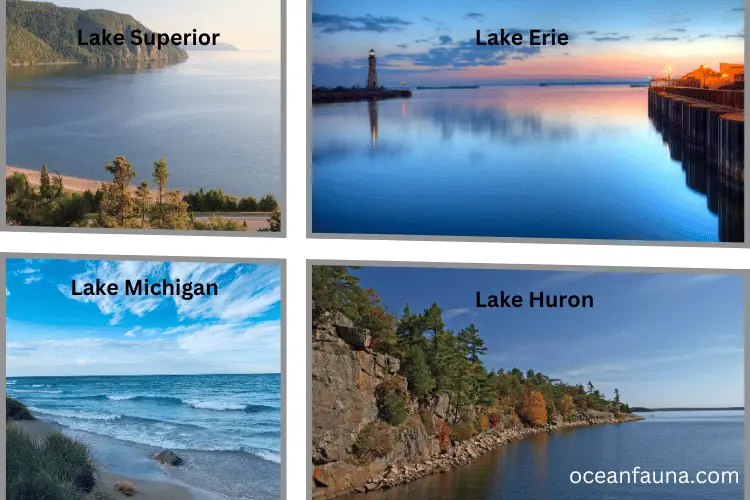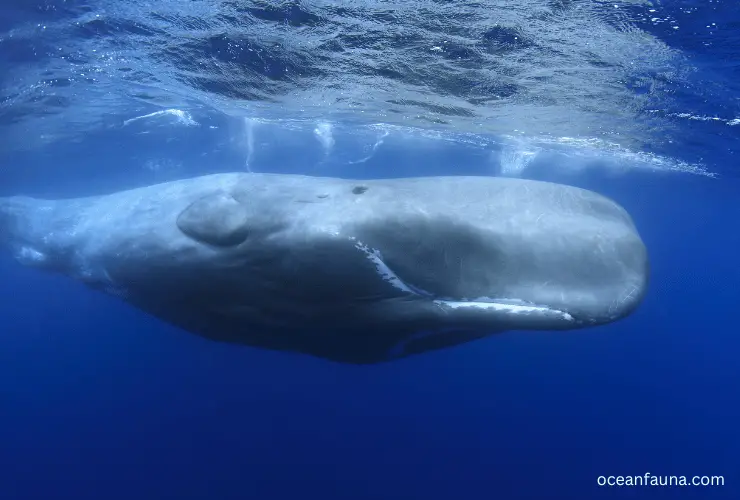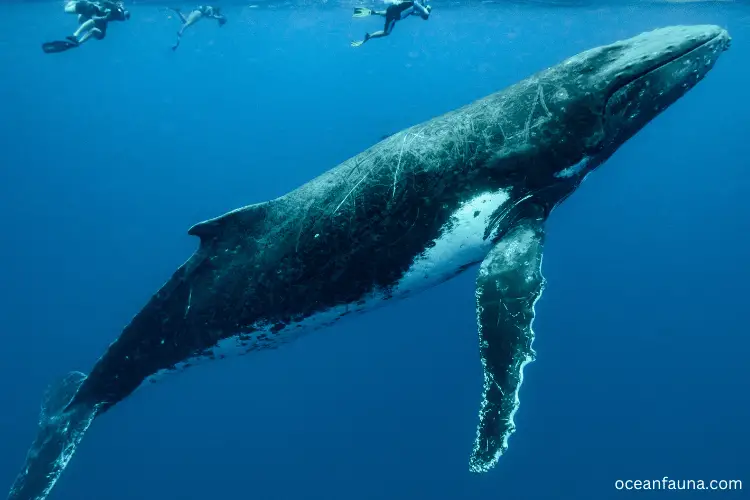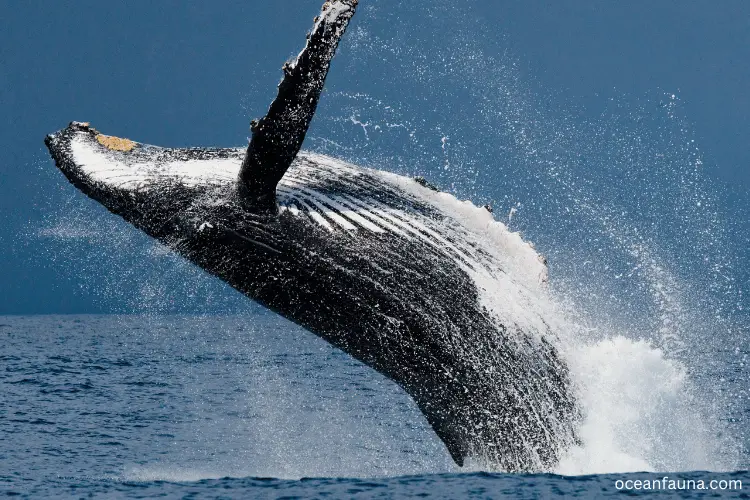Whales, being marine mammals, are specifically adapted to thrive in oceanic environments. But are there whales in Great Lakes? In short, no, the Great Lakes are not oceans, so no whales live there.
Hello, that’s not the end. There are more you need to learn. Apart from being a freshwater ecosystem, there are several reasons why whales can’t live there. Also, at the end of this blog, you will be surprised to know about one whale species that can live not in the Great Lakes but in the St. Lawrence estuary, connected to the lakes.
So, what is that whale species? Let’s find out.
Are There Whales in Great Lakes?
No, Whales do not inhabit the Great Lakes, encompassing Lake Superior, Lake Michigan, Lake Erie, Lake Huron, and Lake Ontario. These lakes are in states bordering Minnesota, including Wisconsin and Michigan.

Whales belong to the order Cetacea, which includes dolphins and porpoises. They are marine mammals that have adapted to life in the ocean and cannot survive in freshwater environments such as lakes and rivers.
However, only one whale species can be found in the saltwater of Quebec’s St. Lawrence Estuary, which is connected to the Great Lakes. This species is the “Beluga whale,” which lives in the Arctic and sub-Arctic regions of the world. They are able to migrate upriver to the mouth of the St. Lawrence River, where they have access to more prey, such as salmon and smelt.
Remember, the beluga whale population in the estuary of the St. Lawrence River is threatened by environmental factors such as great lakes’ pollution, underscoring the importance of protecting this unique species.
Why There Is No Whale in the Great Lakes?
As you know, whales are commonly found in the salty waters of the open ocean. However, the Great Lakes are a freshwater region, which makes it impossible for them to live there. There are other reasons, as well, why whales can’t survive in the Great Lakes. Let’s take a closer look at each of these reasons.

#1. Salinity Level of Great Lakes
Whales require a certain level of salinity in their aquatic environment to maintain their body fluids’ balance. The water of the Great Lakes contains significantly less salt compared to the ocean.
A lack of saltwater can cause dehydration, electrolyte imbalances, and other physiological problems that can lead to the whale’s death. In addition, the freshwater environment doesn’t provide the same buoyancy as saltwater, making it difficult for a whale to move around.
#2. Lack of Food
The Great Lakes ecosystems do not provide the same range of food sources that whales need to survive. Many whales feed on krill, squid, and other small organisms found in the open ocean, not lakes or rivers. The Great Lakes lack a significant number of species that a whale would rely upon for sustenance.
This lack of food would make it impossible for a whale to survive in the Great Lakes for an extended period. Even if a whale could somehow survive in such an environment, its fate would be sealed once the food source is depleted.
#3. Pollution of Great Lakes
The pollution of the Great Lakes severely impacts the biodiversity of these majestic bodies of water. Research says the water that flows from the Great Lakes, through the St. Lawrence River, and into the ocean carries with it a toxic concoction that may be contributing to an alarming increase in the number of whales that perish shortly after giving birth.
Moreover, this pollution poses a grave threat to the lives of the beluga whales residing in the estuary of the St. Lawrence.
Persistent organic pollutants, such as PCB, DDT, and PBDEs, persist in the environment for years and emanate from cities surrounding the Great Lakes and the St. Lawrence River. These hazardous substances accumulate in the food chain, and when a whale consumes contaminated prey, it can suffer from detrimental toxic effects. The health issues caused by these pollutants can render their survival nearly impossible, ultimately leading to their demise.
Do Whales Migrate Through the Great Lakes?

No, whales do not migrate through the Great Lakes. The Great Lakes are freshwater lakes and do not contain the necessary salt content to support the survival of whales, which require saltwater environments.
However, there is a way for whales to migrate in and out of the Great Lakes region. The St. Lawrence River connects the Great Lakes to the Atlantic Ocean and serves as a vital migration route for whales traveling to and from feeding and breeding grounds in the northern Atlantic.
The Estuary of the St. Lawrence River is a migrating route for diverse whale species, including the impressive blue whale, the speedy fin whale, and the acrobatic humpback whale. Around thirteen different whale species are estimated to visit the St. Lawrence region each year, making it an important destination for whale-watching enthusiasts.
Whales typically begin to arrive in the Gulf of St. Lawrence in late May or early June and spend the summer foraging on krill and plankton before beginning their migration southward in late October.
FAQs
Are there humpback whales in Great Lakes?
No, there are no humpback whales in the Great Lakes. However, they can be spotted in the Estuary of the St. Lawrence River during their migration periods.
When do whales migrate through the St. Lawrence estuary?
Whales usually make their way to the Gulf of St. Lawrence in late May or early June, where they spend the summer feeding on krill and plankton before embarking on their southward migration in late October. During this time, they indulge in the abundant marine resources, replenishing their energy for the long journey ahead.
Is there any whale that can live in freshwater?
No species of whale has the ability to survive in freshwater environments. Whales are marine mammals that rely on saltwater for their existence. This specific requirement makes them unable to withstand the conditions of freshwater habitats due to physiological factors and differences in osmotic pressure.
Are There Beluga Whales in the Great Lakes?
No, Beluga whales are not found in the Great Lakes. However, the St. Lawrence estuary serves as a habitat for these magnificent creatures. The estuary provides the ideal salinity levels and environmental conditions necessary for the survival of the whales, making it their preferred dwelling place.
Conclusion
No, whales are not generally found in the Great Lakes for several reasons: lack of salinity, food sources, and water pollution. Although some species of whales pass through the Estuary of St. Lawrence River on their migration journey, none remain in the Great Lakes region permanently, except beluga whales.
The freshwater environment is unsuitable for their survival and can lead to their death if they stay there for an extended period. Therefore, if you want to catch a glimpse of these majestic creatures, it is best to head over to a place like the St. Lawrence River estuary, where hundreds of whales congregate each year between late May and October.
For more detailed information, you may contact us.

